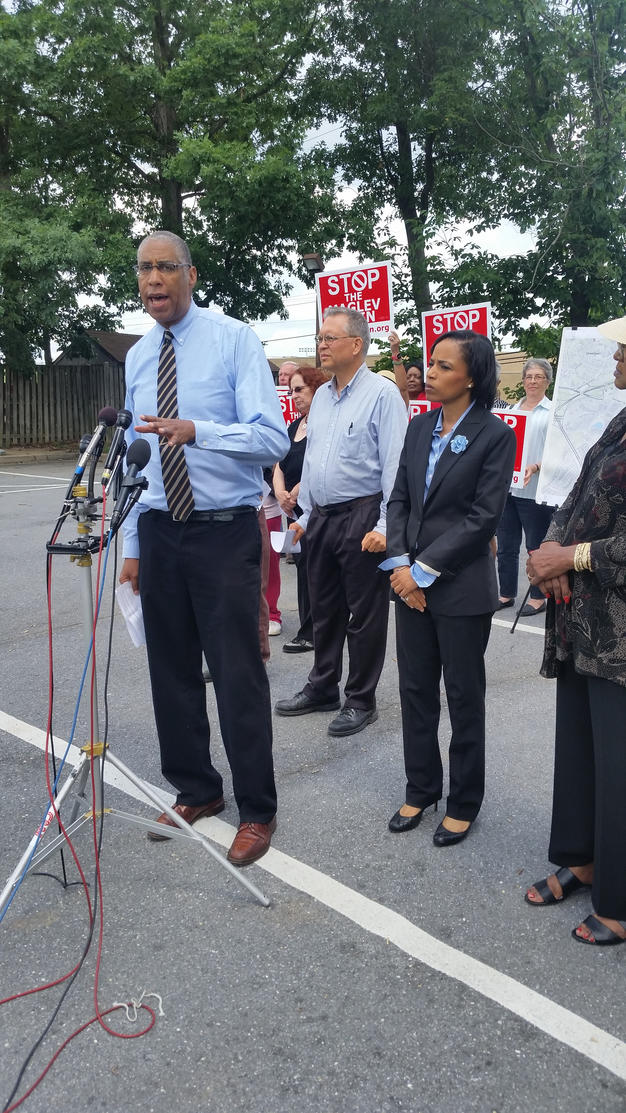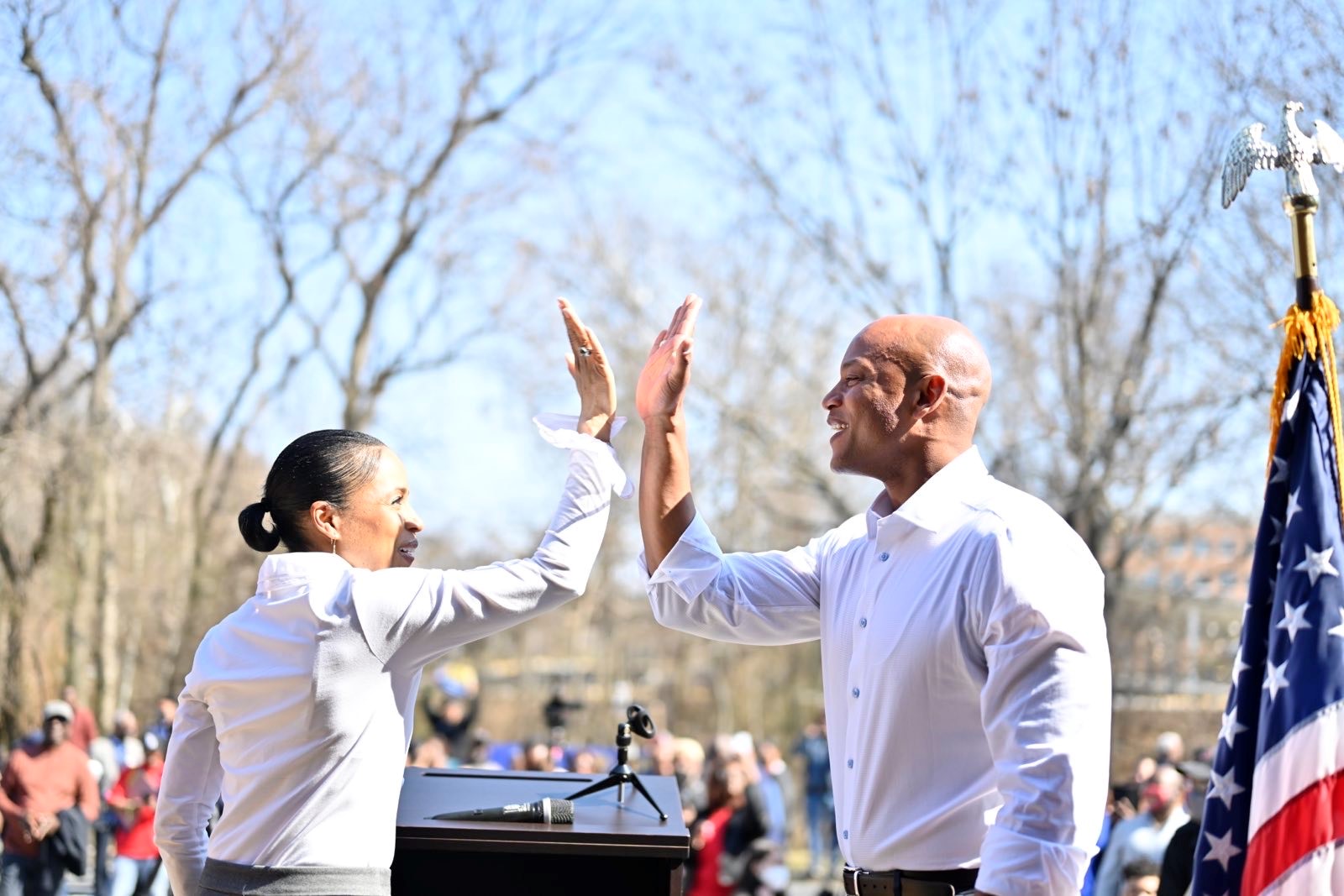Fight Over High-Speed Train Zooms Through Prince George’s Election

Greenbelt Mayor Emmett V. Jordan outlines his opposition to the proposed Maglev high-speed train Wednesday as Prince George’s County State’s Attorney Angela D. Alsobrooks looks on. Photo by Josh Kurtz.
Angela D. Alsobrooks on Wednesday aimed a bullet(train) directly at the heart of her leading opponent in the Democratic primary for Prince George’s County executive, Donna F. Edwards. But Edwards appeared to be ready for the attack and may have even worn the political equivalent of bullet-proof armor.
Alsobrooks, the state’s attorney, joined several elected officials and community activists in Greenbelt to express their opposition to Maglev, the proposed high-speed train that would link Washington, D.C., to Baltimore – and eventually to New York City – carrying passengers at speeds of up to 300 miles per hour. If built, the train could get from D.C. to Baltimore in 15 minutes and from Baltimore to New York in 45 minutes.
The news conference took place at a residential development where, city officials maintain, a contractor connected to the project recently conducted soil testing without getting approval from the city, county or homeowners association. The city government issued a stop-work order.
Critics said the high-speed rail project, the subject of an ongoing environmental review that the Maryland Department of Transportation is conducting for the federal government, would create maximum disruption in Prince George’s County with few tangible benefits. The train, they argued, would threaten residential neighborhoods, schools, religious institutions, businesses, natural resources and historic cemeteries to serve “elites” who would blow through the county without ever stopping.
The two proposed alignments would run roughly along either side of the Baltimore-Washington Parkway — and one would tunnel directly under Eleanor Roosevelt High School in Greenbelt.
Alsobrooks described the proposal as “outright disrespect to Prince George’s County” and “a discourteous project.”
“We need to focus on transportation projects that benefit Prince Georgians,” she said, “like expanding mass transit, and bike trails, and doing more for pedestrians.”
But this wasn’t just a gathering to rail against a rail project. That’s been happening in several Prince George’s communities for many months.
The broader political subtext was the suggestion that Edwards, a former congresswoman, is supporting Maglev — in part because the Laborers’ International Union of North America (LiUNA), a major funder of a pro-Edwards super PAC, is a leading proponent of the rail project. Alsobrooks left it to others to say so — though no one uttered Edwards’ name.
“We have a candidate who is running for the county executive, Angela Alsobrooks, who has made it clear that she is listening to the citizens. She has her ear to the ground,” said state Sen. Joanne C. Benson (D). “Her opponent is saying let it go on. She is not listening to the citizens.”
In an interview, Benson acknowledged that Edwards’ support for Maglev may be a favor to LiUNA, which, campaign records show, has contributed $550,000 to the Edwards-aligned political action committee, We Are Prince George’s.
“She can [support the union’s goals] and not do it at the expense of the community,” Benson said.
But Edwards’ support for Maglev is literally yesterday’s news. Because while it may have been true yesterday, it isn’t today.
Appearing before the Franklin and Eleanor Roosevelt Democratic Club in Greenbelt last January, Edwards, responding to a question about Maglev, said, “I want to give it a shot.”
Edwards told the audience she had ridden a Maglev train in Japan as a member of the House Transportation and Infrastructure Committee, and saw it as “incredibly impressive and transformative technology.”
She argued that Prince George’s County could benefit from the ability of financial company executives from New York and Boston coming to the Washington, D.C., region with such speed and ease, because their companies might want to invest or open offices in Prince George’s.

Greenbelt city officials placed a stop-work order on soil testing for the Maglev project, which they claim was taking place without the necessary permits. Photo by Josh Kurtz.
“We should make sure all our questions are being answered and that projects aren’t being done to the detriment of our communities,” Edwards said at the time. “But I really believe that this idea does have some merit.”
Fast-forward to June, and Edwards is looking at Maglev differently. In an email to a voter that the Edwards campaign circulated Tuesday, the candidate wrote, “After much study and discussions, I believe the MAGLEV proposal, if implemented, gets us further away from real transportation solutions. The costs are staggering, the environmental impacts are immeasurable. And, the overall benefits to the County are few.”
In an accompanying seven-minute Facebook video outlining her priorities, Edwards elaborated. “As I’ve traveled around the county, it’s really clear to me that the project I knew as a concept is actually not really great for us as a community,” she said, later adding, “I have really been greatly educated about the project by community leaders, by advocates, [about] the pros and cons.”
Edwards said she was surprised that the Obama administration in its final days had allocated $27 million to the state to conduct an environmental review of Maglev’s proposed D.C.-Baltimore leg, and believes the state and county should invest money “effectively and efficiently” to improve transportation systems in the county.
End of discussion?
Maybe.
But even if she wasn’t able to box Edwards in on Maglev, Alsobrooks probably benefits from vocally opposing the project. Her argument that it disrespects Prince George’s is sure to resonate with county voters, who often feel ignored and undervalued.
And it also aligns Alsobrooks with liberal activists in and around Greenbelt — prime Democratic voters who might be favorably inclined to Edwards’ progressive and slow-growth message generally.
“I don’t want to make it personal, but I certainly want to make sure that voters are informed” about Edwards’ views on Maglev, said Greenbelt City Councilman Colin A. Byrd, an Alsobrooks supporter. The state is conducting the environmental view for the federal government under the National Environmental Policy Review Act.
Erin C. Henson, a spokeswoman for the Maryland Department of Transportation, said Wednesday that there is no timetable for completing the study. Baltimore Washington Rapid Rail, the company that wants to build the first leg of Maglev, has estimated that doing so would cost $10 billion-$12 billion.




 Creative Commons Attribution
Creative Commons Attribution